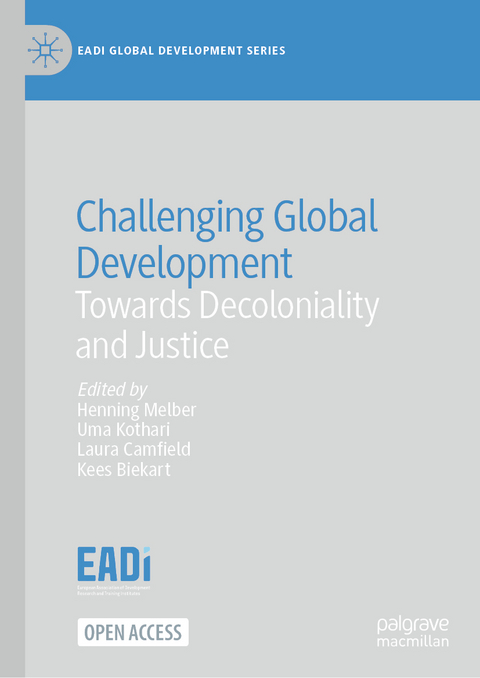
Challenging Global Development
Springer International Publishing (Verlag)
978-3-031-30307-4 (ISBN)
This open access book presents contributions to decolonize development studies. It seeks to promote and sustain new forms of solidarity and conviviality that work towards achieving social justice.Recognising global poverty and inequalities as historic injustices, the book addresses how these can be challenged through teaching, research, and engagement in policy and practice, and the sorts of political barriers these might encounter. From a variety of perspectives and contexts, these chapters examine how decoloniality and solidarity can be developed, offering in-depth historical, theoretical, epistemological, and empirical analyses.
Henning Melber is Extraordinary Professor at the Department of Political Sciences, University of Pretoria, and at the Centre for Gender and Africa Studies, University of the Free State in Bloemfontein, South Africa. Uma Kothari is Professor of Migration and Postcolonial Studies at the Global Development Institute, University of Manchester, UK. Laura Camfield is Professor of Development Research and Evaluation and Head of the School of International Development at the University of East Anglia (UEA), UK. Kees Biekart is Associate Professor of Political Sociology at the International Institute of Social Studies (ISS) of Erasmus University, the Netherlands.
Chapter 1.Rethinking development and decolonising development studies.- Chapter 2. Essentialist approaches to global issues: the ontological limitations of development studies.- Chapter 3. Beyond the Sustainable Development Goals: Post-development Alternatives.- Chapter 4. In search of alternatives to development: learning from grounded initiatives.- Chapter 5. Why Is Development Elusive? Structural Adjustments of Africa in the Longue durée.- Chapter 6. Cultivating post-development: pluriversal transitions and radical spaces of engagement.- Chapter 7. Beyond Deconstruction and Toward Decoloniality: Pedagogy and Curriculum Design in SWANA & South Asia Studies in US Higher Education.- Chapter 8. Data collection versus knowledge theft: relational accountability and the research ethics of Indigenous knowledges.- Chapter 9. Assuming power in new forms: Learning to feel 'with the other' in decolonial research.- Chapter 10. Development and Post-development in a Time of Crisis.- Chapter 11. South-South Cooperation and Decoloniality.- Chapter 12. Decolonising Development Management: Epistemological Shifts and Practical actions.- Chapter 13. What is 'development', and can we 'decolonise' it? Some ontological and epistemological reflections.- Chapter 14. EADI Roundtable: Re-casting development studies in times of multiple crises.
| Erscheinungsdatum | 19.10.2023 |
|---|---|
| Reihe/Serie | EADI Global Development Series |
| Zusatzinfo | XIII, 260 p. 8 illus., 7 illus. in color. |
| Verlagsort | Cham |
| Sprache | englisch |
| Maße | 148 x 210 mm |
| Gewicht | 488 g |
| Themenwelt | Sozialwissenschaften ► Ethnologie |
| Sozialwissenschaften ► Politik / Verwaltung ► Vergleichende Politikwissenschaften | |
| Sozialwissenschaften ► Soziologie ► Spezielle Soziologien | |
| Schlagworte | Conceptual approach • Development Studies • Global Issues • Indigenous knowledges • International Space • open access |
| ISBN-10 | 3-031-30307-5 / 3031303075 |
| ISBN-13 | 978-3-031-30307-4 / 9783031303074 |
| Zustand | Neuware |
| Informationen gemäß Produktsicherheitsverordnung (GPSR) | |
| Haben Sie eine Frage zum Produkt? |
aus dem Bereich


